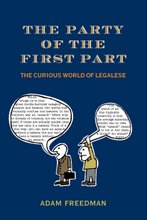To Bear Arms
This has to be the phrase of the week -- perhaps of the year. Depending on which side of the gun rack you stand, "to bear arms" is:
- a plain English term, meaning "to carry weapons";
- an idiomatic phrase, used by the Founding Fathers to convey "military service"; or
- a mistaken spelling of "bare arms" (because the Founders wanted Minutemen to show off their muscles).
Read my full commentary in the next post -- soon to be published (in slightly different versions) in New York Law Journal Magazine and Vocabula Review.

3 comments:
Wasn't the second amendment the 'other half' of the proscription against standing armies? The federal government wasn't to have an army; but the states were to have militias? One wonders if the founders were not very wise indeed as recent events have proven - I doubt they would have contemplated many of the recent adventures, or would have thought them best left to the navy and marines.
I'm not sure I would agree that the Constitution prohibits standing armies. Congress has the power "to raise and support Armies" but they have to re-appropriate the funds for the army at least every two years. The text doesn't say that Congress can't keep appropriating money in perpetuity, but they have to do it frequently enough that the voters can make their objections heard. One interesting argument is that the term "army" in 1787 was understood to refer to a body of paid professionals (eg mercenaries) so that any draft is unconstitutional. But since we don't have a draft at present, the issue doesn't arise...
thank you, this website has provided very useful knowledge for me and others the latest engine specification | tips on buying a vehicle | toyota new car price | Sample Pictures Modern Minimalist House
Post a Comment